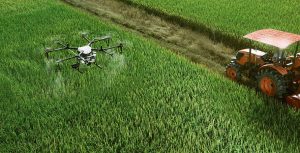
The impact of AI on Nigeria’s Agricultural sector is the focus of our discussion today as we think the sector is making rapid progress. With a population of over 221 million and a rapid yearly growth rate of 2.6%, Nigeria faces significant challenges in meeting the food demands of its citizens. Traditional farming methods struggle to keep up with the population growth, and farmers face issues such as poor seeds, labor shortages, and the encroachment of urbanization on farmland.
The introduction of AI technology brings hope and potential solutions to these challenges by revolutionizing farming methods, automating tasks, and ensuring a sustainable food supply for the future (Read More).
The Evolution of Agriculture with AI
The impact of Artificial Intelligence on Nigeria’s Agricultural sector has ushered in a new era by providing advanced and efficient techniques to replace traditional farming methods. Farmers can now empower themselves with knowledge and skills related to innovative agricultural practices through in-depth research on seeds, climate change, and pest control. AI technology enables farmers to contribute to improved crop yields by adopting specialized methods that ensure crops are fresher, more nutritious, and can be grown anywhere, regardless of climate conditions. This advancement sets the stage for a more secure and smarter food supply with ease.
Soil-less Cultivation: A Paradigm Shift
The impact of AI on Nigeria’s agricultural sector is evident in the significant departure from soil-based farming towards soil-less cultivation techniques. Methods such as hydroponics and aeroponics leverage AI technologies to create controlled environments where crops can thrive without the need for soil. These innovative techniques offer numerous advantages, including efficient resource utilization, precise nutrient delivery, and the ability to grow crops even in urban areas with limited space. AI systems optimize environmental conditions, ensuring optimal plant growth and increased productivity.
Automation and Enhanced Farm Management
One of the most notable contributions of AI to Nigeria’s agricultural sector is the automation of farm tasks. AI-powered systems enable farmers to automate activities such as planting, irrigation, fertilization, and harvesting, reducing the need for manual labor and improving operational efficiency. By minimizing human error and reducing labor costs, farmers can dedicate their time and efforts to critical aspects of farm management, ultimately leading to improved overall productivity.
Effective Pest and Weed Management
AI’s impact on Nigeria’s agricultural sector empowers farmers with advanced tools and knowledge to effectively combat pests and weeds. Machine learning algorithms and AI models help identify specific pests and weeds that hinder crop growth. Armed with this information, farmers can implement targeted measures for pest control and weed removal, significantly reducing crop losses. Real-time monitoring and early detection capabilities provided by AI-based systems enable farmers to respond promptly to potential threats.
Democratizing Access to Agricultural Knowledge
AI’s impact on Nigeria’s agricultural sector goes beyond the farm itself. It has democratized access to agricultural knowledge, making it accessible to individuals without formal agricultural education. AI-powered educational platforms and digital resources offer comprehensive information on crop cultivation, pest management, and farm automation, promoting sustainable farming practices. This accessibility encourages broader participation in the agricultural sector and fosters a more inclusive and knowledgeable farming community.

Key Steps for Nigerian Farmers To leverage the impact of Artificial Intelligence in Nigeria’s Agricultural sector, Nigerian farmers can follow these key steps:
- Embrace AI-enabled technologies designed specifically for agriculture.
- Utilize predictive analytics to make informed decisions regarding planting schedules, fertilization, and pest control.
- Implement precision farming techniques for optimal resource allocation and waste reduction.
- Seek market opportunities for their products to mitigate food losses and waste.
- Collaborate with agricultural research institutions to stay updated on the latest advancements in AI and its applications in farming.
- Participate in AI-focused training programs to enhance skills and knowledge in utilizing AI tools effectively.
- Share experiences and best practices through knowledge-sharing platforms, both offline and online, to accelerate the adoption of AI in the agricultural sector.
In conclusion, the advent of AI technology in Nigeria’s agricultural sector offers a beacon of hope for a sustainable food supply. By adopting AI-enabled technologies, implementing precision farming techniques, and collaborating with research institutions and Agricultural real estate like Hastom Nigeria, farmers can overcome the challenges posed by population growth, urbanization, and limited farmland. With AI-powered solutions for soil-less cultivation, automation, and pest management, Nigerian farmers can enhance crop yields, reduce resource wastage, and contribute to the growth and stability of the agricultural sector. The time is now for Nigerian farmers to embrace AI and secure a prosperous future for food production in the country.
Featured Image Credit: Pixabay
Image Credit: Pxfuel


